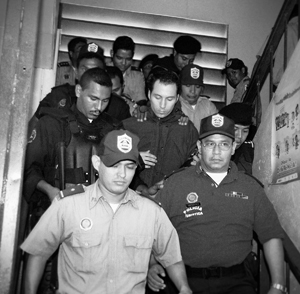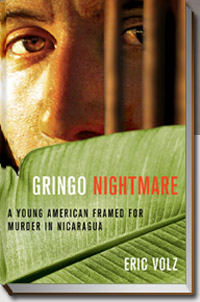 In recent years, institutional kidnappings and "show" trials of American citizens by anti-Washington governments, such as the Andrew Berends matter in Nigeria, the Euna Lee and Laura Ling case in North Korea, the Roxana Saberi case in Iran, and my case in Nicaragua have either become more common, or news desks have simply started reporting them with increasing frequency. As each of our cases played out, we were referred to as "criminal defendants" by the host country's government, but in reality, we were hostages — valuable leverage chips in the eyes of our captors. In each of these cases, it was not until defense efforts were able to tip our status from asset to liability that we were freed.
In recent years, institutional kidnappings and "show" trials of American citizens by anti-Washington governments, such as the Andrew Berends matter in Nigeria, the Euna Lee and Laura Ling case in North Korea, the Roxana Saberi case in Iran, and my case in Nicaragua have either become more common, or news desks have simply started reporting them with increasing frequency. As each of our cases played out, we were referred to as "criminal defendants" by the host country's government, but in reality, we were hostages — valuable leverage chips in the eyes of our captors. In each of these cases, it was not until defense efforts were able to tip our status from asset to liability that we were freed.
The case of American hikers Josh Fattal, Sarah Shourd, and Shane Bauer, currently held hostage by the Iranian government, has struck especially close to home. It is widely acknowledged that they are being detained for political purposes that have nothing to do with the facts of their case. No charge against them has been presented in a court of law. They have been denied access to their lawyer as Iran flagrantly politicizes the case. Make no mistake; they are hostages, not "criminal defendants." The crime is being committed by their captors.
As they approach one year in captivity, my stomach turns. I, unfortunately, have my own memory of what a one-year anniversary at the center of a political crisis feels like. In 2006, while living in Nicaragua, I learned that my ex-girlfriend had been found dead in her clothing boutique — brutally beaten, raped, and strangled. Two days later, I found myself wrongfully accused of her murder, imprisoned, and ultimately sentenced to thirty years. I suffered subhuman conditions, illness, deadly riots, a lynch mob, sadistic guards, and merciless torture at the hands of Nicaraguan officials who enjoyed using my case as a political touchstone in back room negotiations with Washington. It wasn't until a former CIA operative was able to bend the arms of the power actors involved that my case went from being an asset to a liability for Nicaraguan president Daniel Ortega. I was freed in December 2007, after spending more than a year in a maximum-security prison.
 For many Americans the realities of terror, oppression, abuse, and injustice are kept far from their door. In fact, when such events occur there is typically a steep learning curve for the families and friends of those in trouble. Initial decisions may have long-term and far-reaching consequences. Families frequently face barriers with language, culture, legal and political systems, infrastructure deficiencies, and/or other obstacles. Furthermore, these families need to garner popular support and appeal to the appropriate U.S. Government representatives who may have special experience or contacts in a particular host country. Fortunately, for Josh, Sarah, and Shane, their families have learned quickly and seem to be taking the right steps, but they can't solve this crisis alone.
For many Americans the realities of terror, oppression, abuse, and injustice are kept far from their door. In fact, when such events occur there is typically a steep learning curve for the families and friends of those in trouble. Initial decisions may have long-term and far-reaching consequences. Families frequently face barriers with language, culture, legal and political systems, infrastructure deficiencies, and/or other obstacles. Furthermore, these families need to garner popular support and appeal to the appropriate U.S. Government representatives who may have special experience or contacts in a particular host country. Fortunately, for Josh, Sarah, and Shane, their families have learned quickly and seem to be taking the right steps, but they can't solve this crisis alone.
Josh, Sarah, and Shane's personal dignity must be kept as high as possible. They must hold tight to the idea that they are in prison, but the prison is not in them. They cannot give up. I assure you that despite the far reaches of pain and suffering, your support is encouraging and shielding them as they wait. While on a recent phone call with Josh Fattal's brother, Alex, he confirmed to me that Josh, Sarah, and Shane's spirits were lifted when they first heard of the thousands shaking their fists in the name of their freedom. Popular support might not be what brings about their release from prison, but it directly contributes to their survival in prison.
I would not be writing this today had it not been for the dogged persistence and tireless support of family, friends, and complete strangers who rallied for my release. I recall sitting in my cell when a compassionate letter from a complete stranger would bring me back from the depths of despair. I also remember lying awake at night imagining what it must have been like at a fundraiser or vigil that was being held at the same moment, thousands of miles away, in the name of my freedom. The mobilization of my supporters protected me in miraculous ways. Josh, Sarah, and Shane's case has everything to do with you! When we, as a global neighborhood, shine a light on the actors abusing power, the space in which these perpetrators operate becomes narrow, and they will think twice before committing the same crime in the same way. There is no question that avalanching the truth through social networks has more power than any of us could ever have imagined. I am living proof that you can help these young Americans.
Join the hikers' mothers, their friends, and me in a protest outside of the Iranian Mission to the United Nations (40th St. and Third Ave.) in New York City on July 30th between 12:30 and 2:00 pm.
Eric Volz, author of the acclaimed Gringo Nightmare, lectures professionally on international cases complicated by diplomatic tensions. He has been featured on The Today Show, CNN, NBC News, PBS, Telemundo, Univision, The New York Times, The Washington Post, The Wall Street Journal, People, the E! Network, and NPR. This article was originally published on The Huffington Post.















